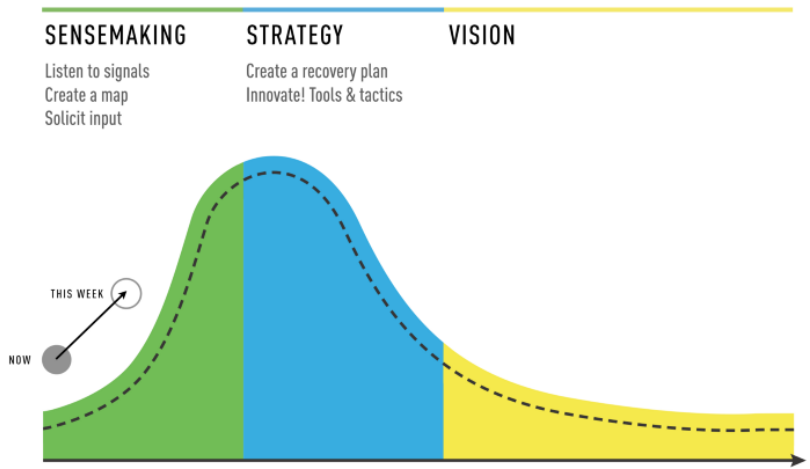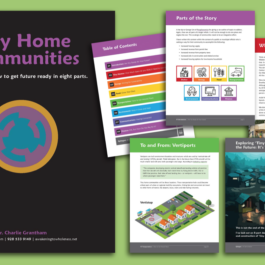What are the top 10 trends for the next ten years? Download the report here.

There’s a capability that all of us should be using right now to stay out of the “chaos” zone and in the “calm confidence” zone.
It’s called sensemaking.
Imagine you’re lost. Your phone is dead and your GPS is broken. When you’re lost, you get frantic. But panicking won’t help.
Instead, lift your eyes to the horizon. Which direction is east?
There, you’ve started your map.
That’s sensemaking: a process for making a map in the midst of a mess so you can make better choices. It comes before strategy, as you can see:

Who’s making sense of things right now?
- New York’s Governor Cuomo does a press briefing every day, showing key statistics and that slide with the apex.
- Governor Herbert’s Utah Leads Together plan is solid map-making. He’s consolidated Utah’s plan into three phases and clarified the key metrics that will help the state move from one phase to the next.
- Johns Hopkins’ global dashboards and IHME’s national and state by state dashboards are helping make sense of the pandemic’s reach and impact.
These maps provide a narrative of what’s happening and what’s expected to happen, so that people can take intelligent action.
Why are these maps so helpful?
Even if the maps aren’t 100% accurate, they give people a sense of what’s coming. That’s critical because uncertainty can be crippling. Maps also help inform better strategy, which gives people a purpose for their efforts.
How do I start?
- Listen to people on the front lines. Ask, What are you seeing and hearing? What are you wondering about?
- Mind the data. It’s tempting to scroll endlessly through your news feed, but that’s not map-making. Data helps you make a good map. My friend Ann leads an association; her team tracks every inbound call they get from members, and what those members are asking about. That’s valuable data. What about you? What data would be useful to you and how can you find it?
- Talk with others whose perspectives you trust. What are they sensing? What maps are they creating? Last week, I asked 7 people whom I consider subject matter experts in local government to meet every Monday, Wednesday and Friday for 30 minutes to share the signals they’re picking up and to make sense of things together. What about you? Who are your trusted advisors, and will they help you with sensemaking?
- Develop a “map” of what’s happening. This could be a metaphor, a series of graphs, or a story. It should convey what matters, what to watch, and how to make sense of what’s going on. The “map” I’m using right now was inspired by a Delphi panel done in South Africa. Leaders charted three critical community impacts: public health, the economy, and social impacts. The “map” I’m using is like a cockpit, with dials in each of those categories.
- Slow down. If we rush to do something, we can make things worse. So slow down, develop your map, test it with others, and then make decisions about what to keep doing, what to change, and what to stop doing.
You can do this. We can do this.
If you enjoyed this post, please subscribe to our newsletter.

Rebecca Ryan, APF
Rebecca Ryan captains the ship. Trained as a futurist and an economist, Rebecca helps clients see what's coming - as a keynote speaker, a Futures Lab facilitator, an author of books, blogs and articles, a client advisor, and the founder of Futurist Camp. Check out her blog or watch her Q&A on how NGC helps organizations prepare for the future using Strategic Foresight. Contact Lisa Loniello for more information.
Yasemin Arikan Promoted to Director of Futures Research
NEXT Generation Consulting (NGC) announced the promotion of Yasemin Arikan to Director of Futures Research. Arikan will lead the company’s efforts to...
Is Your Housing Market Ready for Your Future?
One of the biggest problems facing many cities and towns is inadequate housing. This problem is most acute for seniors, veterans with disabilities, and low-income groups ...
Three Things Martha Stewart Gets Right About Return to Office (RTO)
The original influencer and the person who invented the "Home" retail category, Martha Stewart, became the latest CEO to tell employees to get back to the office five day...







